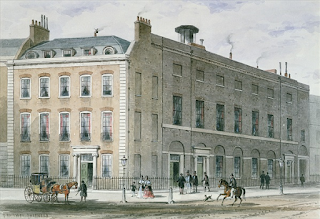 |
| The Gods at Covent Garden in 1805, caricature copyright Victoria and Albert Museum |
In late 17th century London public concerts developed because two technological improvements allowed them to. Pocket watches meant it was affordable to get somewhere at a particular specific time, and broadsheets gave organisers a way of informing people about concerts. Of course, affordable is a relative term, but concert goers would have been gentlemen and ladies, these concerts were public only in the most limited sense. Even in the 18th century the famous concerts at Hanover Square Rooms were for a limited range of people, there was a committee very much like clubs such as Almacks and attendees had to be someone.
But audience members would have had to have time and leisure to attend, concerts were often arranged so that they finished early because of the lack of much if any street lighting. Which also meant if they did finish late, you needed to be able to have access to transport (a carriage, a chair or a link-man) to get home. (The scientific group, the Lunar Society, was so-called because it met at the time of the full moon so members could get home easier). Even in the 19th century Verdi's Don Carlos in Paris would have to be truncated because it over-ran and the audience would miss the last trains to the suburbs. and of course, most of these people would be middle class. The 19th century brought the rise of the middle classes - these were the audience for music, opera and theatre.
 |
| Hanover Square Rooms |
And venues would have a separate place, high at the top, The Gods, available for cheap seats. Such places allowed working men to visit the theatre and kept them well away from the main areas. Downstairs, theatres were still highly class ridden. Even in the 20th century between the wars people could be denied entry to Covent Garden because they were not appropriately dressed. And then Covent Garden opened after the Second World War, it as accepted that dress would be dinner suits, gowns and tiaras.
In the late 1940's when my parents visited Covent Garden they queued on the day to get a token which gave them access to the Gods. But this allowed a boiler-maker from Grimsby and his wife to see Moira Shearer dancing in Sleeping Beauty.
Perhaps the biggest single event at Covent Garden, in terms of attitudes to class, was the removal of the Gods in the 1960's. This was done for reasons of safety, but resulted in the merging of the area with the rest of the theatre, though it would take until the 2000 re-build for everyone to have a common entrance. The story at the London Coliseum is similar, with a side entrance to the Gods only being replaced in their millennium re-build. A surprising fact, given that the company there English National Opera had its origins in providing entertainment for the working class at the Old Vic. So ENO's story is something of the reverse, entertainment for the working class working its way up to be part of the cultural establishment.
The Royal Festival Hall, built for the Festival of Britain, was revolutionary in that it imbued the new optimism of the times and the huge auditorium allowed all to enter by the same means with no areas separate from the others.
Nowadays having opened up performance spaces, in class terms, we find that though technology has altered what can be put on a stage, the essential nature of concerts and opera has not changed much. Where modern technology is changing things is in the ability to use cinema and the internet to provide high quality access to performances. The technology is there to make a genuinely interactive live theatrical experience though no mainstream company has made this leap (In 2013 I remember going to a contemporary fringe opera where the cast were using Twitter, complete with live Twitter accounts being run by the characters, but they did not take it further and invite the audience to interact with the Tweeting characters!)
Elsewhere on this blog:
- Missed opportunity: Prom 65, Alice Coote in Handel - concert review
- Colour and Drama: Mozart and more from Anneke Scott and Ironwood - CD review
- An Avila Diary: My adventures singing triple-choir music by Victoria and Vivanco under Peter Phillips in Spain - feature article
- Serious, independent, fascinating: Music by Edward McGuire from Red Note - CD review
- Charm: Wolf-Ferrari's Suite Veneziana - CD review
- Undeservedly forgotten: Music by Roger Sacheverell Coke - Cd review
- Wartime consolations: Linus Roth plays music by Weinberg and Hartmann which deserves to be heard
- Towering achievement: Beethoven's Diabelli Variations from Nick van Bloss - CD review
- Family connections: Alissa Firsova Russian Emigres - CD review
- Volume 5 of Malcolm Martineau's survey of Poulenc Songs - CD review
- Contemporary opera is alive and well and living in Kings Cross: Tete a Tete festival - opera review
- New voice from Iceland: Hugi Gudmundsson's Calm of the Deep - CD review
- More than frothy fun: Gluck's Il Parnaso confuso from Les Bougies Baroques - opera review
- Sparkling delight: Wolf Ferrari's Il Segreto di Susanna - CD review
- Of great beauty: Monteverdi's L'Orfeo at the Proms - Opera review








%20as%20Leporello%20and%20Erik%20Tofte%20(back%20to%20camera%20in%20garnet%20shirt)%20as%20Giovanni%20-%20Don%20Giovanni.jpg)


No comments:
Post a Comment